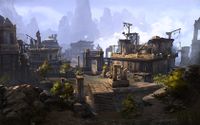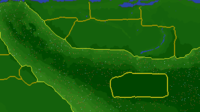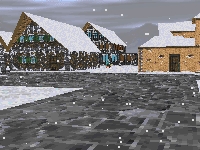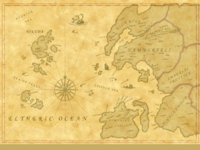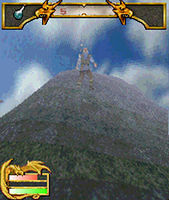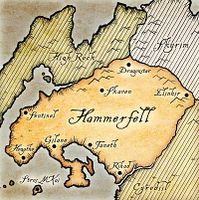Lore:Dragontail Mountains
| Dragontail Mountains | |
|---|---|
| Type | Mountain Range |
| Continent | Tamriel |
| Province | Hammerfell |
| Appears in | Daggerfall, Shadowkey, ESO |
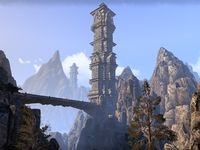
The Dragontail Mountains, (called the Dragon's-Tail in the First Era by Redguards)[1] are a mountain range in northern Hammerfell. They contain the Upper Craglorn region and then curve to the southwest, towards the Fallen Wastes and the Iliac Bay. Politically, the mountains are surrounded by several regions to the east and west. On its western flanks was the Alik'r, Dak'fron, Tigonus, and Santaki. To the east is Lainlyn, Mournoth, Kozanset, and Totambu. The march of Ephesus is located in the middle of the Dragontail Mountains.[2] Regions in the area include the Valley of Blades, Bazidir Valley, Lemdazi Valley, and Ngonta Valley, and named peaks in the range include Mount Dakobo, Mount Ewado, Mount Nombaje, and Heldorn Mount. Other locations of note include Drear and Ganada Pass.[3][UOL 1]
They appear to form part of the Dragon's Teeth Mountains, where they meet the Druadach Mountains near Bangkorai and Craglorn.[4][5]
Contents
History[edit]
The Dragontail Mountains are inhabited mostly by the Redguards and the Orcs, but were also inhabited by the Nedes and the goblins in the past. In the First Era, the goblins of the Dragontail Mountains, led by Warchief Mahgzoor Rockhand, marched through the Fallen Wastes and attacked the great Redguard city of Ojwambu. Even though they seemed numberless, the invasion was eventually repelled thanks to the efforts of the Redguard hero Derik Hallin, who died in the final battle. The city of Ojwambu was then renamed Hallin's Stand after him.[1] The mountains were also inhabited by the Dwemer, who dwelled in their underground cities such as Mzeneldt in the South Dragontail Mountains.[6]
Prior to their occupation of the Systres, House Mornard would often travel across the Bjoulsae River and exploit resources in the Dragontail Mountains, an underhanded practice that despite tainting their relationship with local Redguards, rulers in Wayrest benefitted from it and did little to interfere.[7]
The Abbey of Blades, an ancient training site for Redguard warriors, is located in the mountains in the Valley of Blades. In 2E 582, it was partly damaged in an attack of Mannimarco's minions, however repair work was started by the Abbey of Blades' students.[8] In the same year, the Upper Craglorn region in the northeastern part of the mountains fell under the influence of the Celestial Serpent.[5]
The Empress Kintyra Septim II crossed the Dragontail Mountains with an army during her ill-fated attempt to crush her aunt, the Wolf Queen Potema, during the War of the Red Diamond.[9] In the late Third Era, before the Warp in the West, the Dragontail Mountains were considered a political entity, whose capital was the city of Dragontail.[10] During that time, Mannimarco's headquarters, Scourg Barrow, was located in the region. During the War of the Bend'r-mahk, parts of Upper Craglorn, along with half of the city of Dragonstar, fell under the control of Skyrim.[11]
Culture[edit]
Legends say that Diagna, the Orichalc God of the Sideways Blade, resides within the mountains.[12]
The Scenarist Guild is based out of a citadel nestled high in the mountain range, protected from trespassers by a magical barrier.[13]
Gallery[edit]
The Dragonfields (Shadowkey)
Notes[edit]
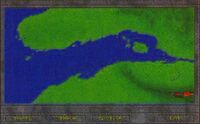
- Early depictions of the Daggerfall world map featured a volcano in the Dragontail Mountains nearing the Ephesus region.[UOL 2] Remnants of this are still present in the game as both the Dragontail Mountains and Ephesus have several volcanic cave dungeons.[14][15] Mount Dakobo is an enormous dormant volcano located within the same area.[UOL 1]
See Also[edit]
- For game-specific information, see the Daggerfall article.
References[edit]
- ^ a b The True-Told Tale of Hallin
- ^ Map of the Iliac Bay – The Elder Scrolls II: Daggerfall
- ^ Map of West Tamriel – The Elder Scrolls Adventures: Redguard
- ^ Arena terrain map
- ^ a b Upper Craglorn in ESO
- ^ Guildmaster Sees-All-Colors' dialogue in ESO
- ^ History of House Mornard — Dorothea Errard
- ^ Kasura's dialogue in ESO
- ^ The Wolf Queen, v6 — Waughin Jarth
- ^ Events of Daggerfall
- ^ Pocket Guide to the Empire, 3rd Edition: The Throat of the World: Skyrim — Imperial Geographical Society, 3E 432
- ^ Varieties of Faith... — Brother Mikhael Karkuxor of the Imperial College
- ^ Daggerfall CD inlay advert
- ^ Dragontail Mountains dungeons in Daggerfall
- ^ Ephesus dungeons in Daggerfall
Note: The following references are considered to be unofficial sources. They are included to round off this article and may not be authoritative or conclusive.
- ^ a b Ted Peterson's posts in War of the Wormgod
- ^ a b NEXT Generation Issue #11 November 1995

